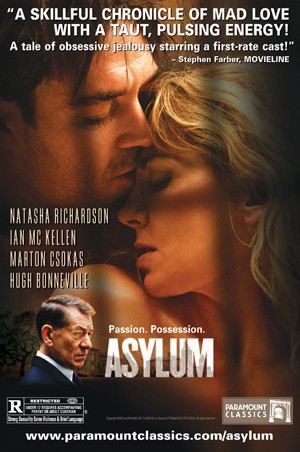
ASYLUM
UK, 2005, 95 minutes, Colour.
Natasha Richardson, Ian Mc Kellen, Martin Csokas, Hugh Bonneville, Judy Parfitt, Joss Ackland.
Directed by David Mackenzie.
Asylum is a misleading title for this drama – it makes it sound too much like the title of a horror film, which it is not. Rather, the setting is the late 1950s where a doctor (Hugh Bonneville) is appointed as deputy head of an asylum. His wife (Natasha Richardson) eventually finds the isolation too much and, while she loves her son, she becomes more estranged from her husband and becomes involved with a seemingly charming patient (Marton Csokas). The patient is under the care of the longtime senior doctor (Ian Mc Kellen).
This is a rather downbeat drama – after all, it could scarcely have a happy ending given the dramatic situation. Audiences will be more interested in the characters and their interactions. Asylum offers quite a meaty role for Natasha Richardson, getting the opportunity to play ordinary, flirtatious, obsessed, threatened, shamed and grieving. Ian Mc Kellen has no trouble in being ambiguously charming and sinister while Marton Csokas (resembling Russell Crowe and originally from New Zealand) is passionately doomed as the artist patient.
On reflection, the content and treatment are what we expected. Director David Mackenzie won critical acclaim with his previous film, Young Adam. The screenplay has been co-written by successful playwright Patrick Marber (Closer).
1.The title: madness, obsession, the institution? Asylum for safety – or not?
2.The 1950s setting: mental health, British asylums, people interned, diagnoses, treatment, cures? The staff, counselling, exercises of power? The role of government and government intervention?
3.The period atmosphere, costumes and décor? The British setting? Musical score? Musical themes for characters and situations?
4.Max, Stella, Charlie? A bonded family, family love? The tensions, the clashes? Max appointed to the asylum? His hopes, work, possibilities of promotion? His expertise? Stella, willing and unwilling, with the women’s groups and their discussions, the meetings? Her role as a wife? The servants? Her being bored? Charlie, his age, love, boyish?
5.The staff, Jack and his presiding over the asylum, his leaving, the openings for promotion? His wife? Peter, his role, authority, the Home Office? On the wards? His patients, Edgar?
6.Max, lifestyle, the promotion, his prim manner, his comment on Stella’s dress for the dance, his suspicions, Stella and her trips to London, his suspicion about the gift, her having hidden it for Christmas, his being sorry?
7.Stella, her character, Max’s mother and her disdain? Meeting Edgar, talking with him, Charlie and the fall from the tree, Edgar carrying him in? The visits? The development of the liaison? The passion? In the house? Max’s mother coming back, Charlie seeing Edgar in the house? Edgar’s escape, the car? His not contacting Stella?
8.Edgar as a character, his art, the murder of his wife, his violent streak, madness? At work, the garden, building? The bond with Charlie? Helping him? At play? The sexual liaison, the passion? In the house, his escape in the car? Hiding, his friend in London? Stella’s visits? Stella leaving and coming to him, her boredom, his growing jealousy? The suspicions of his friend? Having to leave?
9.Max’s mother, hard character, her suspicions? Peter, his questions of Stella, his ability to find her in London? The reaction of Max and Charlie to Stella’s leaving? The role of the police, arresting Stella?
10.Stella’s release, her return, the visit to Charlie, the school, going to Wales, the trip, Charlie and his fishing, her abstracted lack of attention, his death?
11.The mystery of her non-action – wrapped up in herself, knowing that Charlie was drowning, letting him drown or not? Her reaction when she came to?
12.The funeral, all present at the funeral, Max and his diagnosis? Peter and his intervention?
13.Stella, interned, her treatment, Peter and his proposal, going to the dance, Edgar not there – and her going up to the top of the roof, throwing herself down? Her last words?
14.Peter, his motivation, his relationship with Edgar? Stella, having power over her? The end?
15.Edgar, his being treated, his silence, the issue of the dance, his grief?
16.The overwhelming atmosphere of tragedy and pessimism in the film?